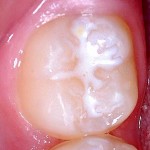
Previous reviews have demonstrated the effectiveness of pit and fissure sealants in preventing caries compared to no intervention. The previous version of this Cochrane review found sealants to be effective in high-risk children although information of the benefit in other groups was scares. There was also little evidence on the relative effectiveness of different types of sealants.
The aim of this Cochrane review update was to compare the effects of different types of fissure sealants in preventing decay in the occlusal surfaces of permanent teeth of children and adolescents.
Methods
Searches were conducted in the Cochrane Oral Health Trials Register, Cochrane CENTRAL, Medline, Embase, ClinicalTrials.gov and the WHO International Clinical Trials Registry Platform database. Two reviewers independently selected studies and abstracted data. Randomised controlled trials (RCTs) comparing sealants with no sealant or a different sealant for caries prevention in children and adolescents up to the age of 20 and with at least 12 months follow up were considered. PRCTs of parallel and split-mouth designs and quasi-randomised trials of split-mouth studies were included. The primary outcome was dentine caries in permanent molars.
Study quality was assessed using the Cochrane Risk of bias tool and overall grading of the quality of the studies was undertaken using the GRADE approach. Outcomes for caries/no caries were presented as odds ratios(OR) or risk ratios (RR) and mean differences (MD) for mean caries increment and meta-analysis conducted.
- Results
- 38 studies involving a total of 7924 children (aged 7-16) were included.
- 15 trials compared resin-based sealant (RBS) against no sealant (3620 patients).
- 3 trials compared glass ionomer sealant (GIS) versus no sealant (905 patients).
- While studies are generally well conducted blinding outcome assessment is not possible because sealants can be identified.
- For RBS versus no sealant
- 2nd 3rd and 4th generation RBS prevented caries in children at 24 months OR= 0.12 (95%CI;0.08 to 0.19) moderate quality evidence. The table below provides an indication of reduction in caries levels at 24 months for 3-levels of caries prevalence
| In control group with surface caries levels | Sealants would reduce caries levels to: | |
| Mean | 95% CI | |
| 16% | 5.2% | 3.13% to 7.37% |
| 40% | 6.25% | 3.8% to 9.63% |
| 70% | 19% | 12.73% to 27.2% |
- Caries prevention was maintained at 40-54 months, OR=0.21 (95%CI; 0.16 to 0.28): RR+ 0.24 (95%CI; 0.12 to 0.45). However only 4 studies are available so the number and quality of evidence is reduced.
- 3 trials compared GIS providing very-low quality evidence.
- Very-low quality evidence means the relative effectiveness of different sealants is unknown.
- No adverse events were reported but only 4 trials assessed them.
Conclusions
The authors concluded:-
Resin-based sealants applied on occlusal surfaces of permanent molars are effective for preventing caries in children and adolescents. Our review found moderate quality evidence that resin-based sealants reduced caries by between 11% and 51% compared to no sealant, when measured at 24 months. Similar benefit was seen at timepoints up to 48 months; after longer follow-up, the quantity and quality of the evidence was reduced. There was insufficient evidence to judge the effectiveness of glass ionomer sealant or the relative effectiveness of different types of sealants. The information on adverse effects was limited but none occurred where this was reported. Further research with long follow-up is needed.
Comments
This well-conducted Cochrane review is the latest update on fissure sealants to prevent occlusal decay. The title of the review has been amended since the 2013 update (Dental Elf – 8th Apr 2013) and has been restricted to sealants placed on the occlusal surfaces of permanent molar and premolars. While 7 additional studies have been included 3 previously included studies are now excluded.
The data from the review shows that is we could expect to see 40% of have occlusal decay after 24 months then we could expect to see this reduced to only 6% is we applied fissure sealants. This evidence is graded as ‘moderate’ which means reasonable certainty of this finding. The evidence also demonstrated that sealants were effective at follow-up periods of longer than 4 years. However, because of the limited data we are less certain of these finding. 38 of the trials also reported retention data showing 90% retention at 12 months, and 80% at 24 months with 70% after 48-54 months. From a clinical perspective these important reductions in caries levels and high retention levels support the routine application of fissure sealants to molars an premolars to all children at medium to high caries risk.
As the authors recommend, more data on long-term outcomes would be helpful as well as data from head to head comparisons of different sealants to clarify relative effectiveness.
Links
Primary paper
Ahovuo-Saloranta A, Forss H, Walsh T, Nordblad A, Mäkelä M, Worthington HV. Pit and fissure sealants for preventing decay in permanent teeth. Cochrane Database of Systematic Reviews 2017, Issue 7. Art. No.5: CD001830. DOI: 10.1002/14651858.CD001830.pub5.
Other references
Dental Elf – 20th Jan 2016
Dental Elf – 8th Apr 2013
Review recommends fissure sealants for caries prevention in permanent teeth

[…] Fissure sealants effective in preventing caries in children and adolescents […]
[…] Fissure sealants effective in preventing caries in children and adolescents […]